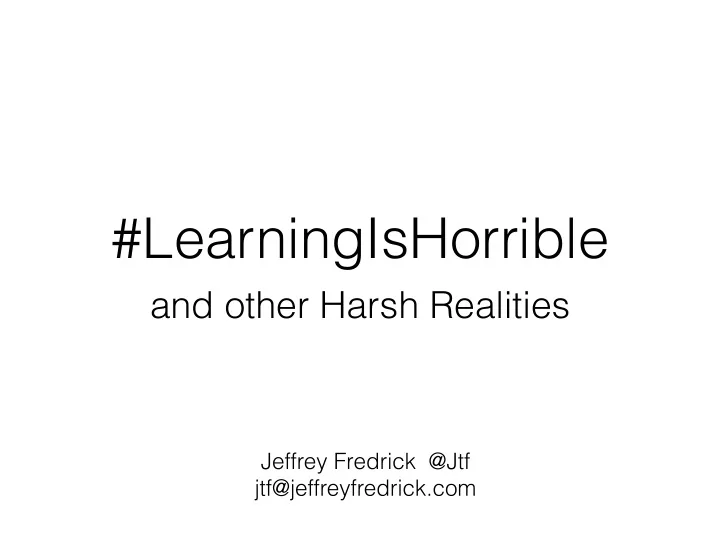

#LearningIsHorrible and other Harsh Realities Jeffrey Fredrick @Jtf jtf@jeffreyfredrick.com
• Doubled reoccurring revenue in 5 years • Launched products in three new markets • Increased productivity, autonomy and self- organization • Largely the same people (just 30% fewer of them)
• The harsh realities of being human work against true collaboration • High performance requires difficult emotional work (among other things) • You can begin practicing the required skills today
• Do you like to be wrong?
• Do you like to be wrong? • Do you like to learn?
• Do you like to be wrong? • Do you like to learn? • That’s what learning feels like.* (#LearningIsHorrible) * http://blog.jeffreyfredrick.com/2015/10/22/thats-what-learning-feels-like/
• System 1 operates automatically and quickly, with little or no effort and no sense of voluntary control • System 2 allocates attention to the effortful mental activities that demand it • Most of what you think and do originates in System 1, with System 2 called upon to prevent errors
• “At regular intervals, the team reflects on how to become more effective, then tunes and adjusts its behavior accordingly.” http://www.agilemanifesto.org/principles.html
The Uncanny Valley of a Functional Organization , Ben Thompson http://is.gd/wnF7sK
“A highly influential management theorist, Argyris was widely regarded as the father of organizational learning.” http://www.gse.harvard.edu/news/13/11/remembering-professor-chris-argyris
• You are making a proposal in meeting and the main stakeholder you are trying to convince glances down and checks their watch. What do you do?
How did you decide what to do when that person checked their watch? The Ladder of Inference illustration from The Fifth Discipline by Peter Senge
Assumptions* • I see the world as it is; those who disagree don’t • I am right; those who disagree are wrong • I have pure motives; those who disagree have questionable motives • My feelings and behavior are justified • I am not contributing to the problem * The Skilled Facilitator by Roger Schwartz, 2002
Eight Behaviors for Smarter Teams , Roger Schwartz, 2013 http://www.schwarzassociates.com/resources/articles/
Our aim is to be a high- performing company High performance requires teamwork and continuous learning
Espoused Theory Theory in Use
Deliberate practice required
Emotional Agility 1. recognize your patterns 2. label your thoughts and emotions 3. accept them; and 4. act on your values https://hbr.org/2013/11/emotional-agility
image https://en.wikipedia.org/wiki/User_talk:W.carter
#LearningIsHorrible search terms: “Argyris” “mutual learning model” “action science meetup” “you’re not so smart” Jeffrey Fredrick @Jtf jtf@jeffreyfredrick.com http://blog.jeffreyfredrick.com https://devblog.timgroup.com
Recommend
More recommend